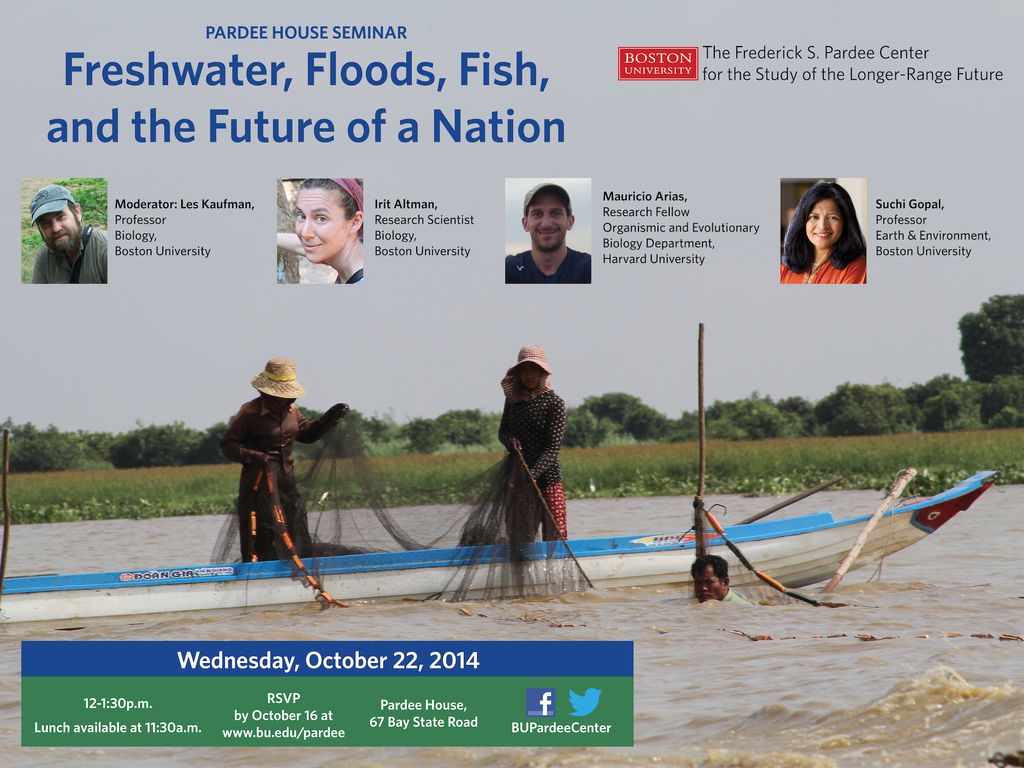Next Pardee House Lunch Seminar Set for Wednesday, October 22
The Frederick S. Pardee Center for the Study of the Longer-Range Future is pleased to announce a Pardee House Seminar titled “Freshwater, Floods, Fish, and The Future of a Nation.” The seminar will be held at the Pardee House, 67 Bay State Road, on Wednesday, October 22, 2014 from 12-1:30p.m. (lunch will be available starting at 11:30a.m.). Seating is limited and advance registration is required by Thursday, October 16. Click here to register.
Pardee Center Faculty Fellow Les Kaufman (Biology, Boston University) will moderate the session. Featured speakers will be Irit Altman (Biology, Boston University), Suchi Gopal (Earth & Environment, Boston University), and Mauricio Arias (Organismic and Evolutionary Biology, Harvard University). The panel will discuss how researchers are working to connect with local communities as well as policy makers concerning their work examining the impact of human-induced changes to freshwater ecosystems that provide food and support the well-being of a significant number of people in Cambodia.
This event will be streamed live online.
Irit Altman is a Research Scientist in the Department of Biology at Boston University focusing on understanding patterns and drivers of ecosystem service maintenance and delivery in marine and freshwater ecosystems. A benthic marine ecologist by training, she is particularly interested in identifying how species assemblages contribute to ecological function and how ecological function in turns affects human communities. As part of her work she continues to refine a modeling framework for data and knowledge integration. The modeling approach supports interdisciplinary and collaborative hypothesis development and testing and has been applied to case studies in the Massachusetts Ocean and Cambodia.
Suchi Gopal is a Professor in the Boston University Earth and Environment Department. She received her Ph.D. from the University of California, Santa Barbara in the field of Geography and Artificial Intelligence. Her research is multidisciplinary dealing with spatial analysis and modeling, GIS, data mining and information visualization, and artificial neural networks. Her current research projects include the development of a spatial decision analysis system on a mobile platform, assessing the impact of climate change on food security and biodiversity in Cambodia, urban landcover characterization using fuzzy sets, crime analysis, and mapping maternal health service delivery in Zambia.
Mauricio Arias is a Giorgio Ruffolo Post-doctoral Research Fellow in the Sustainability Science Program based at the Harvard’s Department of Organismic and Evolutionary Biology. His research aims at creating science-based linkages between the hydrological cycle, ecosystems, and society in order to promote sustainable management of water resources. He has studied physical, biological, and chemical properties of freshwater ecosystems in Colombia, United States, China, New Zealand, and most recently in Cambodia, where he carried out his doctoral research. Mauricio is investigating the effect of hydropower operations in river flows and how hydrological alterations through the Amazon basin could be mitigated while maintaining electricity generation needs. He is contributing to the Initiative on Sustainable Development of the Amazon and its Surrounding Regions: The Interplay of Changing Climate, Hydrology, and Land Use led by Paul Moorcroft. Mauricio holds a Bachelor of Science and a Masters of Engineering in Environmental Engineering Sciences from the University of Florida. He recently completed a Ph.D. in Civil Engineering from the University of Canterbury in New Zealand, where he was awarded UC’s International Doctoral Student Scholarship. Mauricio’s doctoral research focused on the Mekong River Basin, where he quantified the impacts of hydropower development and climate change on the hydrology and ecology of the Tonle Sap, Southeast Asia’s largest lake and one of the most productive freshwater fisheries on the planet.
Les Kaufman, Professor in the Boston University Marine Program, is an evolutionary ecologist who studies basic processes that drive the creation, collapse, and conservation of aquatic species diversity on coral reefs and tropical great lakes. His interests are increasingly turned toward clinical research on the dynamics of human-natural coupled systems, to create supporting science for global sustainability and climate change adaptation. His current research focuses on adaptive management of populated coastal ecosystems, taking an experimental approach to marine management areas; dynamic modeling and forecasting of ecosystem service production and trade-offs; genomics as a tool to diagnose organismal response to the combined effects of local and global human stressors; and hybrid models examining the effects of dams and climate change on food security in Africa, Asia, and South America. In addition to being a member of the BU faculty, Kaufman is Senior Marine Scientist for Conservation International, a Research Scholar with The New England Aquarium and Associate in Ichthyology, Harvard Museum of Comparative Zoology. He serves on the Science and Statistics Committee for the New England Fishery Management Council, and is working with National Oceanic and Atmospheric Administration (NOAA) colleagues to modernize federal ocean science. Kaufman also writes popular books, magazine articles and television, including multiple stints as either author or subject with NOVA and National Geographic. He was awarded the first marine Pew Fellowship in 1990, was selected to receive the Parker-Gentry Award in Conservation Biology for 2011 from the Chicago Field Museum.
